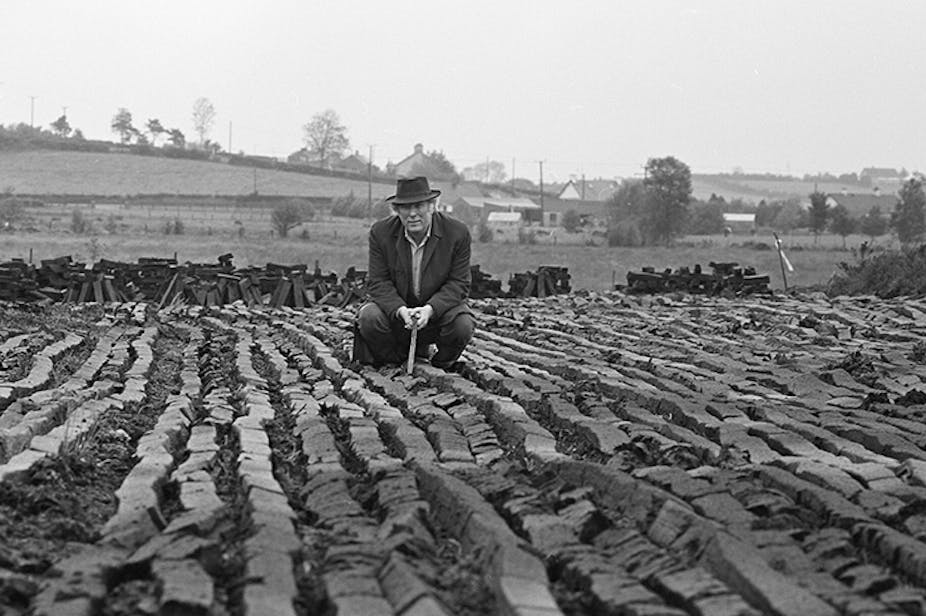The sudden death on Friday of the Irish Nobel prize-winning poet Seamus Heaney has focused international minds and media on the power of poetry to affect our lives.
This is especially true from an environmental perspective. We can better understand the modernity of Heaney’s relationship with the natural world by comparing him, as many others have done, with the other Irish Nobel prize-winning poet, William Butler Yeats (1865-1939).
Both poets were “national” poets during their lifetimes, and both sourced much of their poetry in the natural world, especially rural Irish locations. Yet it is the differences between the two poets’ approaches to the natural world that are instructive.
For Yeats, the life of the rural peasant was an ideal existence, both poetic and pure. For Heaney, drawing on his rural, farming childhood, the natural world was violent as well as bounteous. Rather than viewing nature through a nostalgic lens, as Yeats did in much of his early work, Heaney’s portraits of rural life represent its hardships and its cruelties.
In Digging, for instance, Heaney poeticises the labours of previous generations of his family, “stooping in rhythm” as they harvest potatoes and turf. He provides a clear example of the harsh physicality, and sensuality, of rural life, in a way that speaks of necessary interdependence:
The coarse boot nestled on the lug, the shaft
Against the inside knee was levered firmly.
He rooted out tall tops, buried the bright edge deep
To scatter new potatoes that we picked,
Loving their cool hardness in our hands.
This physical engagement, rather than the mental and idealistic one that we see in Yeats, is highly reflective of current environmental concerns. Breaking away from an abstract conception of nature is a crucial step towards facing up to current environmental issues. Heaney’s representation of the natural world as something that must be physically experienced is therefore wholly relevant to current concerns.
With its attentiveness to specific locations in Northern Ireland, the poetry seems to revolve around a limited set of geographical coordinates. This concern with the importance of local place to one’s sense of identity surely speaks directly to contemporary debates on environmental responsibility at global levels.
This is not to suggest that Heaney promoted a narrow localism in his work. Rather, as global citizens, we must become more sensitive to, and protective of, the ties that bind us as individuals and communities to our native landscapes. And Heaney exemplifies this in his fascination with place names, and with the links between language, culture and geography. We encounter this most explicitly in his 1972 collection, Wintering Out, where he writes about specific locations in three separate poems: Anahorish, Toome, and Broagh.
Heaney’s writing in both poetry and prose was always sourced in the apparent banality of everyday life and mundane routine. In his first collection, Death of a Naturalist (1966), we encounter potato digging and blackberry picking. In his final volume, Human Chain (2010), the poet recalls bales of hay and sacks of grain.
By making such normal, even mundane topics his focus, Heaney instills his poems with a sense of the deep mysteries and enchantments of even the most unremarkable object, person or habit. This means that his poetry reaches beyond the surfaces of natural phenomena, and does not view the natural world from a utilitarian perspective. The natural world therefore becomes something is central to our cultural lives, and never merely just resources to be used and disposed of at will.
His work thus promotes respect and reverence for the natural world, but, equally, reminds readers of their own mortality even as nature reproduces itself. Heaney’s poetry inspires humility in our attitude to the environment, and in his final collection he offers a telling verse to communicate this message. In A Herbal, he writes:
Everywhere plants
Flourish among graves,
Sinking their roots
In all the dynasties
Of the dead
His work makes poetry from the solid objects of humanity and labour, but it also insists on the transience of life. This brief extract expresses the interconnection of human and natural life-cycles, while suggesting that the triumph of man over nature is not inevitable.
Though never assuming an overtly political voice, Heaney’s work was never apolitical, and as an artist he kept an unbreakable faith in the ability of poetry to speak truth to power. As he wrote in The Redress of Poetry (1995):
[The] redressing effect of poetry comes from its being a glimpsed alternative, a revelation of potential that is denied or constantly threatened by circumstances.
With Heaney’s death, Irish and world literature has lost a voice of conscience. The work that remains, however, is a body of poetry capable of providing ethical and critical direction.

